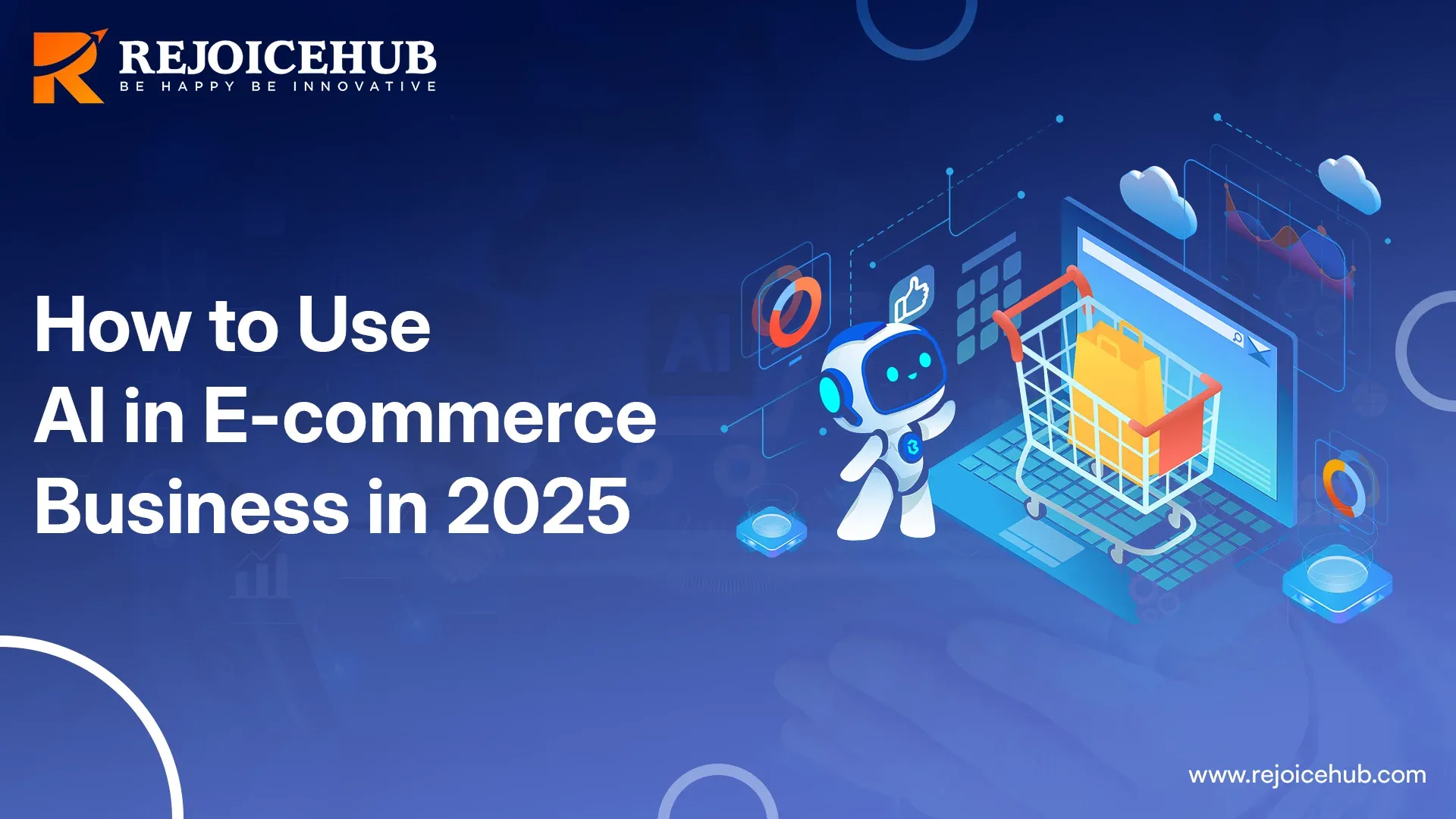
Have you ever noticed that when you open any e-commerce platform and all the products on its homepage look very attractive to you, and you feel like buying all the products? This happens because all these e-commerce businesses use advanced user behaviour algorithms and AI, which makes it possible to give personalized product suggestions to everyone.
After the advent of AI, a lot of growth has been seen in the e-commerce business, and many experts are predicting that this market will surpass the $6.8 trillion mark by 2026. This gives us a lot of insight about the potential of e-commerce, so let’s learn how you can effectively use AI models and tools in your e-commerce business.
Types of AI Technologies for E-commerce
In e-commerce, many different AI and technologies are used according to the platform and products. Let us now try to understand the technologies a little closely.
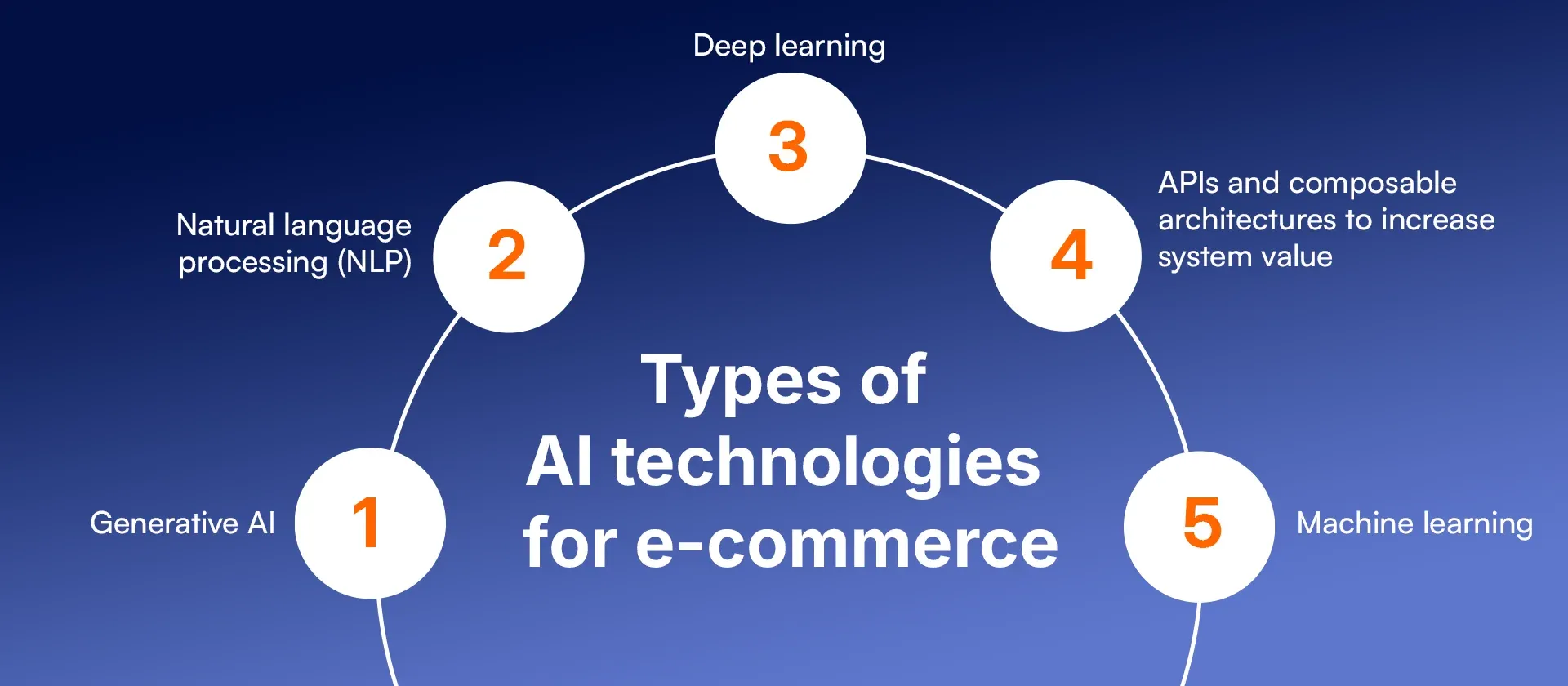
1. Generative AI: Generative AI uses advanced models like LLMs (Large Language Models) to generate content such as product descriptions, email copy, ad creatives, and even images or videos. In e-commerce, generative AI tries to scale your business by using content creation in your e-commerce business, and it also enhances product discoverability a lot.
2. Natural Language Processing (NLP): This model integrates search bars and chatbots in the e-commerce platform so that they can understand human language. This allows AI to interpret queries correctly and give the right answer according to the user’s query. And when the user's query is solved quickly, it also increases customer retention and experience.
3. Deep Learning: You can consider deep learning as a copy of the human brain because it tries to process information in the same way as the human brain processes it. It's especially useful in e-commerce for image recognition (e.g., visual search), voice shopping, fraud detection, and even sentiment analysis. It also plays an important role in product suggestions.
4. APIs and Composable Architectures: Traditional e-commerce platforms are quite messy and ultra-coded, due to which there are high chances of bugs and issues in the platform, but modern E-commerce platforms use advanced APIs, due to which they can outsource different features and processing methods. APIs allow e-commerce to help different services like personalization engines or logistics optimizers work seamlessly together, significantly increasing overall system intelligence and adaptability.
5. Machine Learning (ML): ML algorithms analyze massive datasets to uncover patterns, automate decisions, and continuously improve over time. Be it product recommendation or optimizing ads, ML can run all these processes effectively.
How to Get Started Using AI in E-commerce
Let us know how you can integrate AI into E-commerce and what things businesses should keep in mind before using AI, so that AI can be used effectively and businesses can grow.
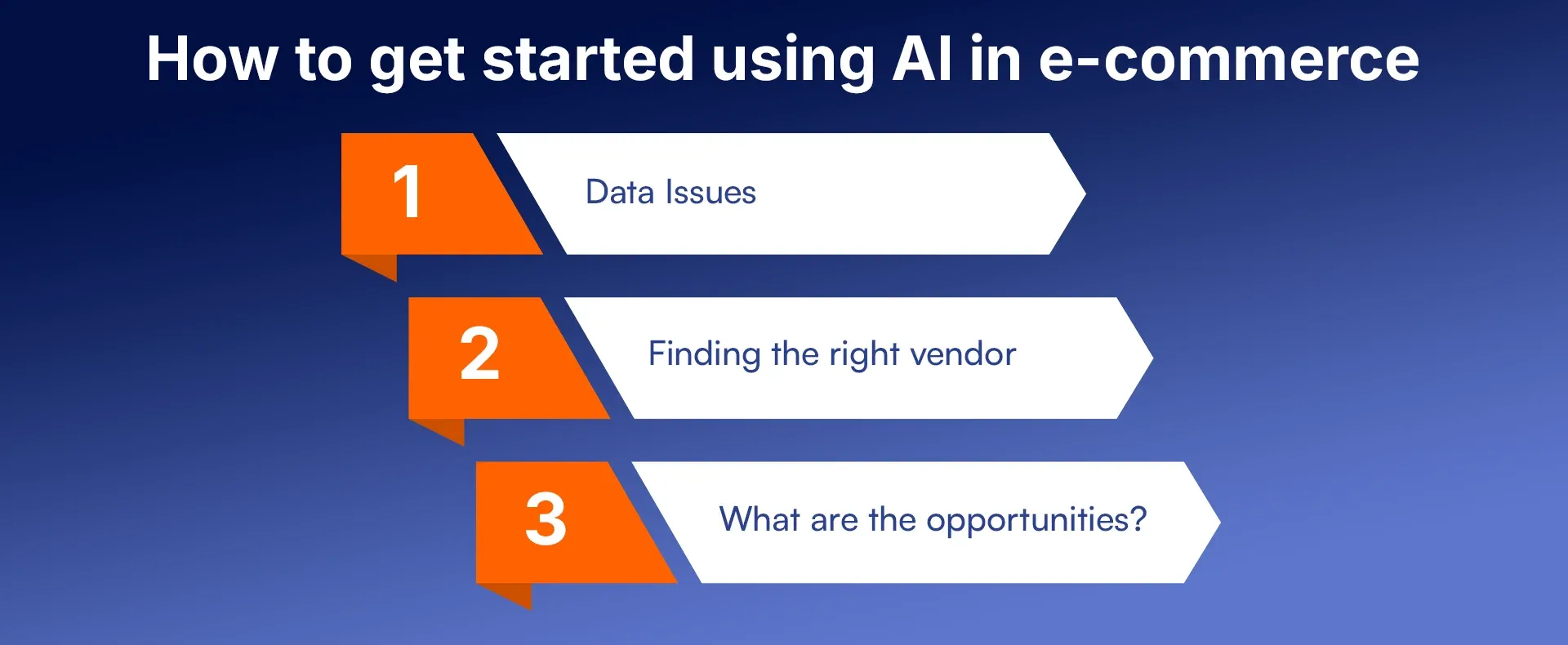
1. Data Issues
As we know that any AI model or its functionality is perfect only when good data is fed to it during the training of the AI. E-commerce businesses must ensure that data is clean, unbiased, and accessible. Often, this means consolidating customer data from different platforms (CRM, ERP, POS) and making it AI-ready.
2. Finding the right vendor
Whenever you choose an AI partner, choose according to your needs because not all AI partners are equally built. You have to see whether you need personalization platforms (like Bloomreach, Algolia) or AI chatbots (like Drift, Intercom) in your e-commerce business. Choose an AI that is aligned with your solution and can fulfil your needs, budget, and tech stack.
3. What are the opportunities
Always focus on your opportunities in e-commerce, in which try to understand the pain points of your business like whether the price of your products is high or the description of your product is not generic, once you get to know about the pain points of your business, then according to that you will be able to choose such a partner which proves to be worth it for your ROI.
Also Read: What is AI in Marketing? A Complete Guide
Benefits of Using Artificial Intelligence in E-commerce Companies
Artificial Intelligence has automated E-commerce businesses in a way, because AI models can provide all the capabilities like product suggestion, payment gateway and query solver Chatbots, but apart from this, there are many other benefits that are obtained by using Artificial Intelligence in E-commerce.
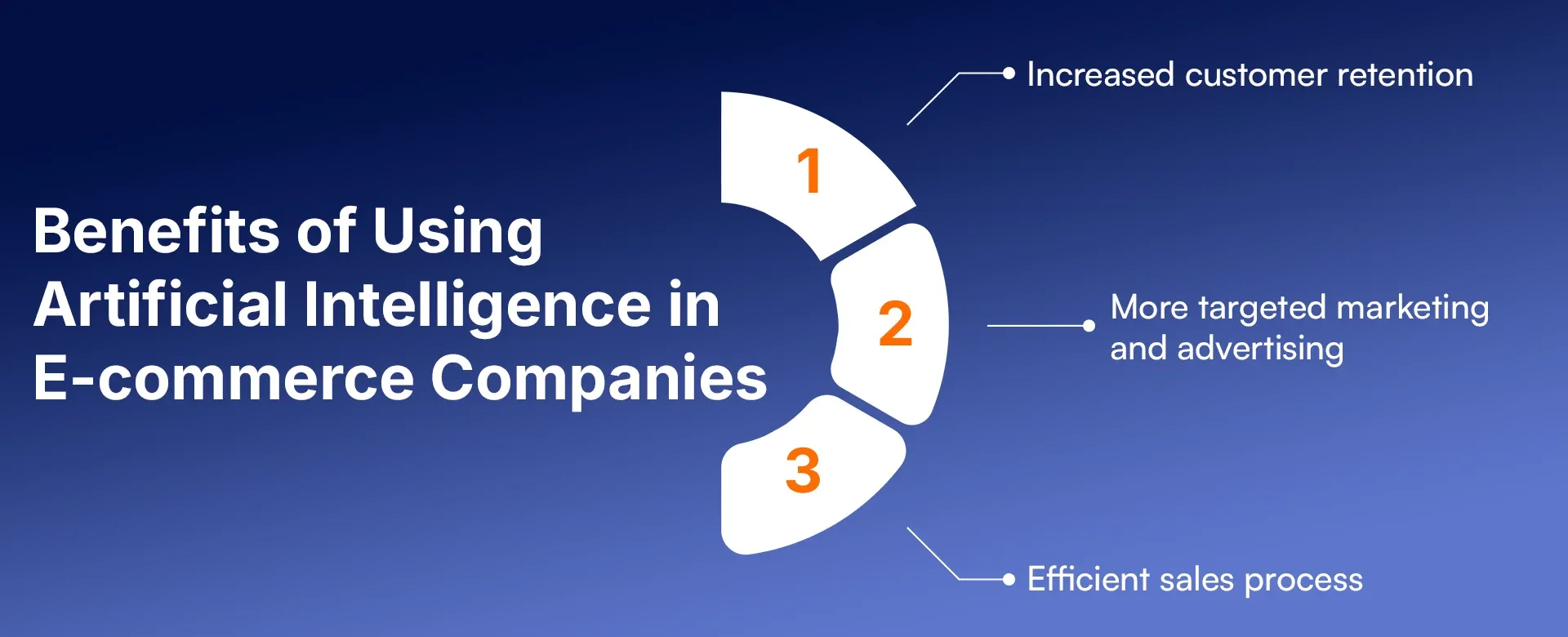
1. Increased Customer Retention
The Ecommerce platform in which AI is used gives personalization based product recommendations, due to which user retention increases by 10-15% according to McKinsey. And it also increases brand loyalty and user experience significantly.
2. More Targeted Marketing and Advertising
AI precisely targets audiences of different segments, and Ads are also kept quite hyper-personalized through AI; hence, the retention of the e-commerce platform increases a lot due to AI. And it not only improves ROAS (Return on Ad Spend) but it also helps in targeting your brand voice in the right way.
3. Efficient Sales Process
With the help of AI APIs, chatbots smartly automate query handling, query solving and message follow-ups very effectively, and most of the time, the user does not even realize that they are talking to an AI Chatbot, and this makes your sales funnel smoother and more effective.
AI Use Cases in E-commerce
Let us know how AI is used in the E-commerce business and what its use cases are.
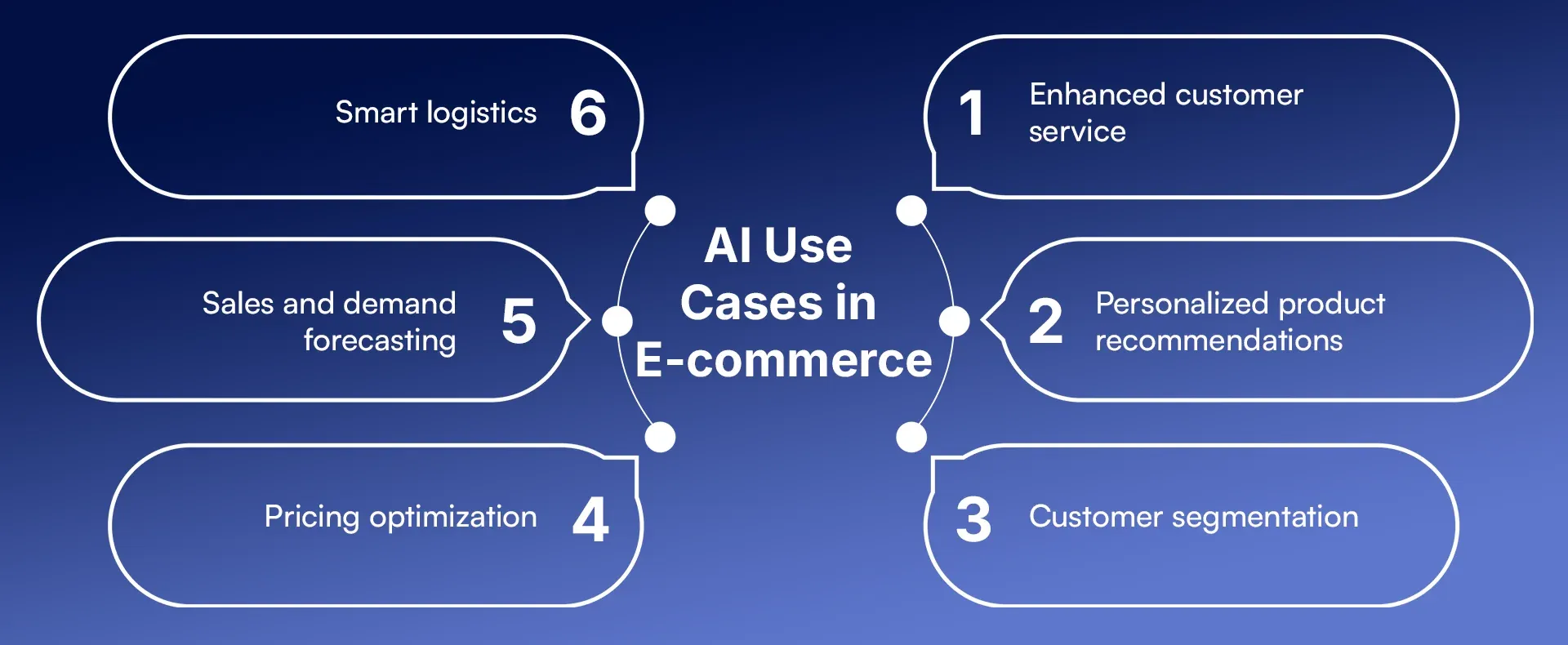
1. Enhanced Customer Service: AI chatbots and virtual agents provide 24/7 support, handle routine inquiries, and escalate complex issues to human agents. AI Chatbots save 80% of the time of Human customer support executives, as basic issues and FAQ related queries can be easily fixed by AI Chatbots, due to which human executives can spend their time on real problems.
2. Personalized Product Recommendations: As we already know, AI integration in e-commerce significantly increases user retention and profitability, and machine learning plays a significant role in this as it analyzes past behaviour to recommend products that customers are more likely to buy, boosting AOV (Average Order Value).
3. Customer Segmentation: AI tools create customer profiles in detail based on user behaviours, preferences, and demographics, which helps businesses in precise targeting.
4. Pricing Optimization: If you have ever used an Indian e-commerce platform like Meesho or Flipkart, you must have also noticed that the prices there fluctuate a lot and work in lower price mode in real time, which makes the user feel very special, and these pricing dynamic algorithms adjust in real time based on demand, competition, and inventory and user buying history to maximize profit.
5. Sales and Demand Forecasting: AI tools can predict future sales based on trends, seasonality, and historical data, helping manage inventory better. This increases the profitability of businesses a lot and also makes it possible to manage demand and supply in real time.
6. Smart Logistics: There are many such AI-powered logistics tools available in the market, and these logistics systems optimize delivery routes, predict delays, and improve warehouse management with real-time data.
How to Implement AI in E-commerce
We already know in detail about how AI impacts E-commerce, now let's try to understand how AI can be integrated into E-commerce.
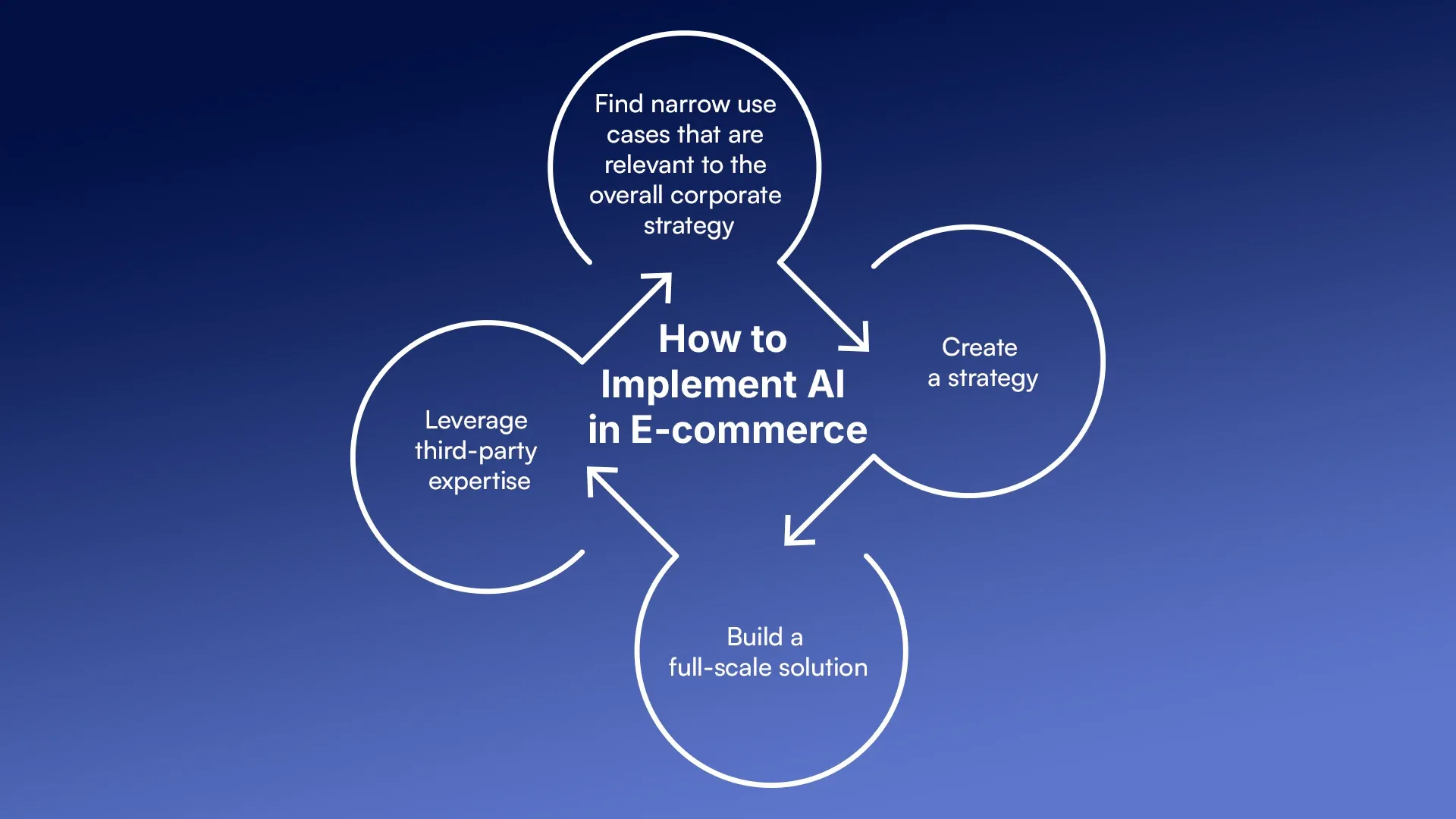
-
Before integrating AI into your E-commerce business, you want to use it in small projects so that you can use it according to your goals, like you can enhance the search functionality and product suggestions of your E-commerce so that the user can find the product easily.
-
First of all, you should make a strategy for your business that defines clear objectives. Is your goal to increase conversion? Reduce CAC? Your strategy should outline what success looks like. This helps you choose the right AI partner or model.
-
Build a Full-Scale Solution. Once a proof of concept works, scale it. This may involve integrating it into your full E-commerce platform, training staff, and establishing workflows. Since repeated AI integration significantly increases costs, effectively integrating AI once can be a smart decision.
-
Leverage Third-Party Expertise, collaborate with AI experts or agencies who understand e-commerce. They can accelerate deployment, minimise errors, and fine-tune models. In this case, you can choose firms like RejoiceHub that can effectively help with AI integration and software solutions for your e-commerce business.
The Future of E-commerce with AI
Let's try to know about future trends and how the future E-commerce market is going to be due to AI. In future, AI will not only enhance the e-commerce model but will completely change the shopping experience. E-commerce giants like Amazon and Flipkart will create autonomous stores which will be managed by their staff, and this will give the customer a Hyper-personalized experience.
Many new AI-generated influencers and shopping assistants will come to the market, which will help the users related to shopping. E-commerce platforms will use real-time dynamic pricing so that losses can be avoided and products can be saved from getting wasted. As generative AI and quantum computing advance, businesses will experience good growth, and user experience will also be enhanced.
Conclusion
Using AI in e-commerce is not a futuristic concept as mega giants like Flipkart, Amazon, and Meesho are already using advanced AI algorithms and suggestion models, and are reshaping digital commerce to a great extent. Whether you're a startup or an enterprise, leveraging AI for e-commerce business can supercharge your growth, reduce costs, and enhance customer satisfaction.
Starting, you should take from your available business data so that you can use the best AI for your business needs and operations, which will have a positive impact on your business. For this, you can use AI or software solutions firms like RejoiceHub that can help you in the best AI deployment with a lot of business expertise and software support.
Frequently Asked Questions
1. How can AI enhance personalization in e-commerce?
AI uses the user's past shopping behaviour, search patterns, demographics, and product-like systems to make the best product recommendations to the user.
2. What are the challenges in implementing AI for e-commerce?
Overall challenges depend on the e-commerce platform, but common issues include poor data quality, lack of internal expertise, high setup costs, and choosing the wrong vendor.
3. Is AI suitable for small e-commerce businesses?
Absolutely, Many AI tools are scalable and cost-effective, especially those offering no-code or SaaS solutions.
4. How does AI improve conversion rates?
By personalizing recommendations, optimizing pricing, and streamlining the checkout process, AI reduces friction and boosts sales. Apart from this, the E-commerce platform also gives a lot of discounts to new users so that user interest can increase further.
5. What is the future of AI in e-commerce?
When AI is used in e-commerce business, you can expect deeper personalization, voice and visual search, automated inventory management, and AI-generated marketing content to become standard. And this shopping experience will take business growth to the next level.
